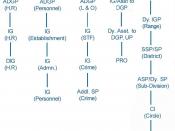To be successful in today's world, organizations must quickly respond to a competitive and continuous changing environment. In most cases that means being innovative, reinventing themselves' and changing many of the established ground rules of their own industry. Organizational leaders can't allow their staff to settle and be content with ideas of the past. Organizations must challenge its management staff to embrace change while continuing to look for ways and methods to improve. In many instances, an organization's structure can impact the degrees of its successes. For instance, an organization with a decentralized structure, which has open communication system, tends to be more innovative. Organizations that are more highly centralized with most of the decisions being made at the upper level, tend to be much slower in their actions because of decisions that are handed down from level to level, where as the decentralized organizations tend to react faster because it empowers its employees and allows them to make decisions at all levels of the organization.
An organizational system that is being used world wide by many organizations is that of the cross-functional team. This team concept brings together employees from various functional units within the division and it enables them to implement and integrate new ideas more rapidly, because of the upfront teamwork that limits the amount of trial and error normally associated with change. The cross-functional team approach provides an upfront opportunity to research the impact decisions will have on each functional area and modify them accordingly.
The organizing function of management is the deployment of organizational resources to achieve strategic goals. The deployment of resources is reflected in the organization's division of labor into specific departments and jobs, formal lines of authority, and mechanisms for coordinating diverse organization tasks. Organizing is important because...


